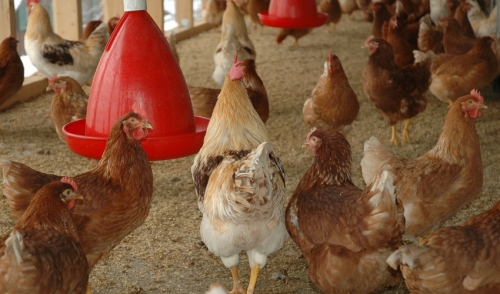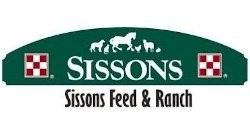
Causes and Prevention of Coccidiosis in your Flock
One of the challenges you face as a bird owner is the threat of a common, and potentially devastating, disease called coccidiosis. But once you understand what causes it and how it spreads, you can feel more confident about your ability to limit its impact on your flock.
Good Health
Coccidiosis is caused by a microscopic parasite called coccidia that is transmitted via the droppings from infected birds. In other words, anywhere there’s a microscopic trace of bird poop—in a waterer, a feeder, or in bedding—there's almost certainly coccidia present.
Symptoms of coccidiosis include weight loss, paleness, ruffled feathers, depression, huddling, unwillingness to eat, and watery or bloody diarrhea. All birds are at risk, but growing birds and young adults ages 3 to 5 weeks old seem most susceptible.
The good news is that birds in relatively good health with strong immune systems are equipped to ward off coccidiosis, as long as they do not become stressed or overexposed to unsanitary conditions. A mild case may even pass unnoticed. Once a flock survives an outbreak, it will be immune to that particular coccidia organism (there are nine different species that can infect chickens, however, so the disease can rear its ugly ahead in a new form).
The other good news is that each species of coccidia is 'host-specific'. That means the type of coccidia that could infect your turkeys is not the same type that could infect your chickens (or geese or quail, etc.). So coccidiosis cannot spread from a chicken to a goose—but it can spread like wildfire from chicken to chicken.
When coccidiosis is allowed to proliferate unchecked, it invades the lining of the intestines causing tissue damage and interfering with nutrient absorption. It can be devastating to a flock.
Sound Management
One of the best ways to prevent a coccidiosis outbreak is by practicing responsible sanitation and litter management. Coccidia thrive in damp, warm conditions, so wet litter around the waterer is a virtual parasite paradise.
Believe it or not, when the conditions are just right, coccidia can survive for up to four years outside a bird's body. And these hardy little organisms can be transmitted via boots, equipment, insects and rodents. So you’re going to need a multi-tiered approach to minimize the threat. Here are some suggestions:
- Keep the premises as dry as possible. Coccidia love moisture.
- Never introduce new adult birds into your flock. Birds that appear healthy can be carriers of a number of deadly diseases. Quarantine them first.
- Raise chicks in isolation. Mature birds can pass along diseases and parasites to vulnerable young birds.
- Thoroughly clean and disinfect the brooder between broods. This includes any equipment the chicks will come in contact with. Once the premises are dry, place four to six inches of dry, fresh litter material (wood shavings or a commercial absorbent litter material) on the floor.
- Provide clean water at all times. A typical problem is that brooder bedding or dust (containing feces) gets scratched into the water source. If possible, elevate the waterer slightly. Clean waterers relentlessly. If you wouldn't be willing to drink the water yourself, it's not clean enough. And never let the waterer run dry—it will force the birds to search for water in puddles, which are almost certainly contaminated.
- Provide clean bedding. Coccidia are spread through the feces of infected birds. If feces are in the bedding, they're on the birds’ feathers. And if feces are on the feathers, the birds will ingest them while preening (using their beaks to clean themselves). Replace wet bedding around waterers and add bedding to any problem spots.
- Let sunlight do some of the work. Coccidia hate sunlight. It’s a natural disinfectant. Incorporate as much natural sunlight into your brooder as possible.
- Ask your veterinarian about vaccinating. A commercial coccidiosis vaccine is available, but it's not beneficial for every flock. Consult your veterinarian before using the vaccine.
Remember, exposure to coccidia isn’t the threat—frankly, it’s unavoidable. Even wild birds carry coccidia. Instead, the serious threat comes from prolonged over-exposure to coccidia in a stressful, unsanitary environment that can overwhelm a bird's immune system.
Good Nutrition
There's one more important weapon that you can employ as part of your multi-tiered defense against coccidiosis: medicated feeds containing a coccidiostat that controls the growth of coccidia in the digestive tract.
Purina Mills® Start & Grow® Medicated is formulated for layer chicks and can be fed until eight weeks of age to prevent coccidiosis. For broiler chicks and turkey poults, there's Purina Mills® Flock Raiser ® Medicated. (Flock Raiser® Medicated is not FDA approved for use in ducks or geese.)
Both of these feeds provide a complete and balanced diet for the birds they were designed for. No other supplemental feeds are necessary. When you consider that a strong immune system is a bird’s best natural defense against coccidia and other diseases, investing in good nutrition from the get-go is a smart way to ensure the health of your flock.
Now that you’re armed with the straight poop on coccidiosis, we hope you feel prepared to defend your flock against this stubborn disease. Good luck.
